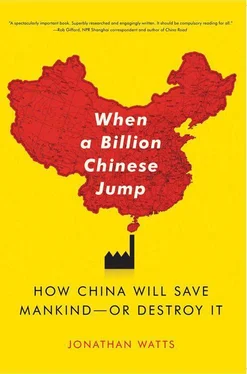17. National Statistical Yearbook 2008 (China National Bureau of Statistics, 2008).
18. As of 2005, there was just a single trained wildlife biologist in Qinghai Province, while Gansu had three. The combined area of these two regions is the size of Europe. They had no shortage of geologists and hydroengineers (Harris, Wildlife Conservation in China, p. 15). Interview with Wang Sung, former head of the Wildlife Conservation Society.
19. John MacKinnon, head of the EU-China Biodiversity Programme, private conversation, January 2009.
20. According to MacKinnon, “The decimation of wild medicinal plants could threaten the health of millions of people around the world who rely on traditional medicine to treat serious illness, according to scientists.”
21. Figures provided by Traffic in 2006 (www.traffic.org).
22. Interview with John MacKinnon.
23. A clause in the law states: “Governments in different levels should set nature reserves in areas and waters where wild animals live and breed.” This does not specify that animals should be kept in their natural habitat.
24. Data on captive musk deer tend to be regarded as a state secret, thus even Chinese surveys have difficulty establishing exactly what goes on at musk-deer farms. All the bears in China produce ursodeoxycholic acid, a bile fluid considered to have medicinal properties, but sun bears are small, so probably produce less bile, and brown bears are more aggressive. So most of the farmed bears are Asiatic black bears (Harris, Wildlife Conservation in China, p. 88).
25. Violations of the Wildlife Conservation Law can result in long prison terms, and more than thirty people have been executed for killing or trading elephants and giant pandas (Jeffrey A. Sayer and Changjin Sun, “Impacts of Policy Reforms on Forest Environments and Biodiversity,” in William F. Hyde, Brian Belcher, and Jintao Xu [eds.], China’s Forests: Global Lessons from Market Reforms [Resources for the Future, 2003], p. 181). Despite such harsh penalties, however, the laws remain weak because they are not implemented with sufficient funds, personnel, commitment, or organization.
Responsibility for protecting wildlife is fragmented among at least five ministries. The main responsibility lies with the state forestry administration, which manages most of China’s nature reserves, but other parks, zoos, breeding centers, and protected areas fall under the ministry of environmental protection, the ministry of construction, the ministry of agriculture, and the state oceanic administration.
26. The reserve was moved to Bifengxia Panda Breeding Center after Wolong was damaged in the Sichuan earthquake.
27. John MacKinnon, “More than Just Pandas,” Biodiversity Matters Newsletter, 5 (2008).
28. The success rate is 85 percent.
29. As I later discovered, such practices are commonly used by sheep and cattle farmers across the developed world, though apparently semen-milking with artificial vaginas was preferred because the sperm count and quality tended to be better.
30. The rental fee varies according to the place and circumstances. American and Japanese zoos pay top dollar. In other cases, pandas are loaned for little or no fee as a gesture of friendship.
31. It is not the only controversy. The designation of the area as a nature reserve accelerated deforestation as developers cleared land for hotels and roads. New forest plantations have not provided the preconditions for bamboo growth and so have not been able to serve as a new panda habitat (Harris, Wildlife Conservation in China, p. 116).
32. This view was put forward most vividly by Chris Packham, the head of the UK’s Bat Conservation Trust and a BBC presenter, who said of the giant panda: “Here is a species that, of its own accord, has gone down an evolutionary cul-de-sac. It’s not a strong species … Unfortunately, it’s big and cute and a symbol of the World Wide Fund for Nature and we pour millions of pounds into panda conservation” (Liz Thomas, “Let the Panda Die Out, Says BBC Presenter Chris Packham,” Daily Mail, September 22, 2009).
33. Interview with Jim Harkness.
34. Talking to me soon after the release, the scientist sounded like a proud father: “Xiang Xiang is doing very well. His weight has increased by fifteen kilos. We taught him how to choose good bamboo.” He told me the panda had been satellite-tracked on journeys of 9 kilometers, a sign of confidence. “We are hoping he will fight with other males during the mating season next year.” Unfortunately, that appears to be exactly how the panda was killed a few months later. Markings on Xiang Xiang’s body suggest he was pushed out of a tree. It was his second bloody fight of the season. Zhang withheld news of the death for three months (Jonathan Watts, “Captive-bred Chinese Panda Dies in the Wild,” Guardian, May 31, 2007).
35. Until recently, about half of panda mothers gave birth to twins, one of which usually died through neglect. Zhang says it is very difficult for mothers to look after both twins, because infants are not capable of urinating or excreting until they are six months old. The mother must lick them clean far more often than any human parent changes their baby’s nappies. Having struggled with this problem for years, the Wolong team can now almost guarantee the survival of both twins by rotating the babies between their mother and the nursery. Keepers clean the babies by using a cotton swab warmed to the same temperature as the mother’s tongue. Thanks also to improvements in artificial feeding techniques, the survival rate is more than 95 percent, up from 50 percent in the 1980s.
36. This was a positive step because many panda communities had fewer than twenty animals, and needed to link up to mate.
37. “A recent paper by Berta Martín-López and colleagues in Conservation Biology reports that the size of an animal’s eyes appeared to be people’s main measure for determining whether they think an animal is important enough for them to open their pocket books and pay for its conservation” (Tony Whitten, “How Cute Do You Have to Be to Be Safe?” blog on World Bank website, April 8, 2008).
38. “Certainly some species have been driven to extinction since the 1980s, for example, snakes and turtles. In the 1980s, few people ate these animals but since the 1990s, there have been more and more restaurants that serve these exotic dishes. Around that time, China used up many of its domestic animals so it started to eat animals outside China. The situation is getting worse. Snakes and turtles are being taken from the wild. There is a market for them now. The price is going up” (Interview with Xie Yan of the Wildlife Conservation Society of China). Xie cited the case of the yellow-headed box turtle, which is endemic to Anhui. In the 1980s, there were around 2,000 left in the wild. But in the WCS’s most recent survey, they found none.
39. This is particularly true in Guangdong and Guangxi, where a common saying has it that people will eat everything with four legs except a chair, everything that flies except an airplane, and everything in the water except a submarine.
40. Jonathan Watts, “Student Activists Try to Save Wildlife on China’s Menu,” Guardian, May 15, 2009.
41. Though this too proved controversial when hunting licenses were auctioned mostly to rich Westerners (Jonathan Watts, “China Puts Price on Head of Rare Animals,” Guardian, August 9, 2006). This led to a furious online backlash (Xinhua, “Auction of Hunting Quotas Postponed,” August 12, 2006).
42. There has been a possible sighting of a lone baiji since, but even if confirmed, it is thought highly unlikely there will be sufficient dolphins to continue the species.
Читать дальше










